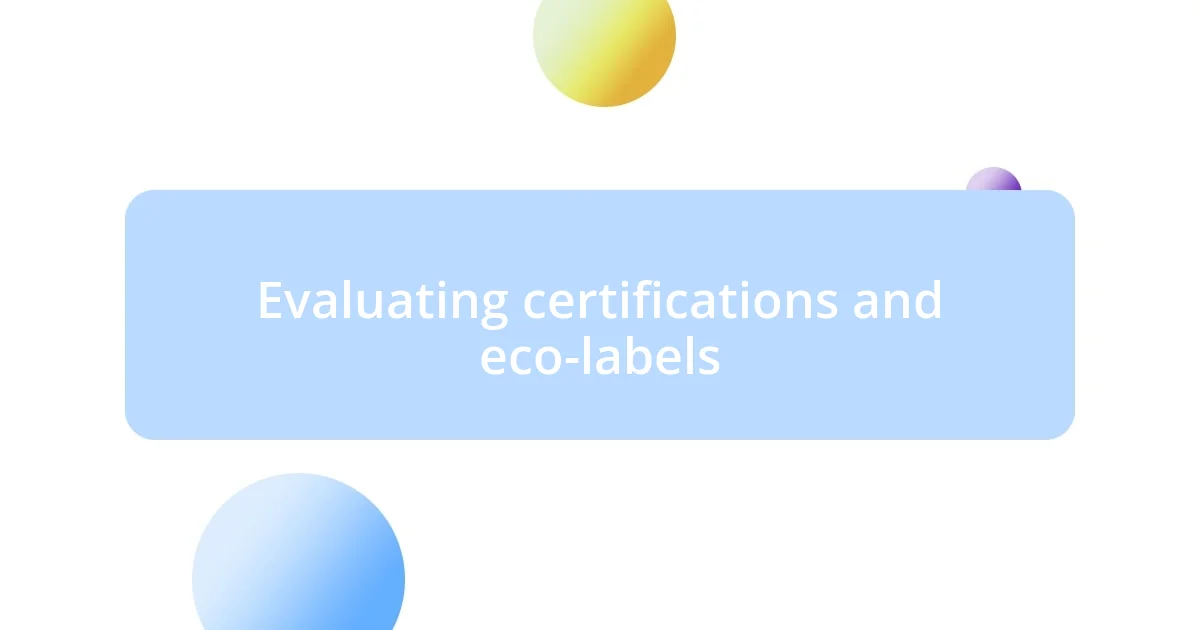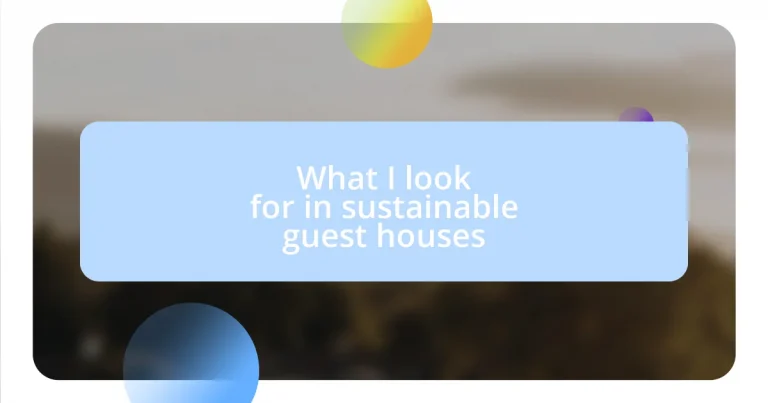Key takeaways:
- Sustainable guest houses prioritize eco-friendliness by utilizing renewable energy, reducing waste, and supporting local economies through locally sourced materials and products.
- Key features of eco-friendly accommodations include energy efficiency, water conservation, and community engagement, enhancing guest experiences while promoting environmental responsibility.
- When evaluating sustainable lodgings, it’s essential to check for credible certifications and transparency regarding their eco-friendly practices to ensure genuine commitment to sustainability.

Understanding sustainable guest houses
Sustainable guest houses embody a commitment to eco-friendliness, often utilizing renewable energy sources, waste reduction practices, and locally sourced materials. When I stayed at a cozy eco-lodge in the mountains, I was amazed by how they harnessed solar energy to power their facilities. It made me wonder: could all accommodations follow this model and contribute to a greener planet?
These establishments prioritize not just environmental stewardship but also community engagement. During my visits, I’ve encountered guest houses that hire staff from the local area and support nearby artisans by showcasing their crafts. It struck me how much richer my experience became when the hospitality was intertwined with the culture and traditions of the region, stirring a sense of belonging and connection.
Moreover, sustainable guest houses often emphasize conservation and education. I recall a stay where the owners passionately shared their journey towards sustainability, taking me on a tour of their organic garden and explaining the importance of biodiversity. Have you ever thought about how much we can learn from these places? Each visit offers not just shelter but also valuable insights into living in harmony with nature.

Key features of eco-friendly accommodations
Eco-friendly accommodations often feature energy-efficient designs that minimize their carbon footprint. I remember staying at a guest house where all the lighting and appliances were powered by energy-efficient systems, which not only reduced energy consumption but also made me feel good about my choice to stay there. It’s remarkable how such small adjustments can contribute to a much larger environmental impact.
Water conservation is another key feature. In one sustainable retreat I visited, they had installed low-flow showers and toilets that maintained comfort while saving water. I was pleasantly surprised to learn that these systems can significantly reduce water usage, making a vacation more guilt-free and responsible. When you see these systems in action, it reinforces the idea that luxury and sustainability can go hand in hand.
Sustainable guest houses also emphasize the use of locally sourced and organic products. During my stay at a charming inn, I enjoyed breakfast made from ingredients sourced just a few miles away. The freshness was evident and made the experience truly memorable. I realized how vital it is for accommodations to support their local economy while providing guests with authentic flavors and a sense of place.
| Key Feature | Description |
|---|---|
| Energy Efficiency | Utilization of energy-efficient appliances and designs to minimize carbon footprint. |
| Water Conservation | Features like low-flow fixtures to reduce water usage while maintaining comfort. |
| Local Sourcing | Focus on using locally sourced and organic products for meals and amenities. |

Importance of local sourcing
Local sourcing plays a pivotal role in sustainable guest houses, as it directly supports local economies while reducing the carbon footprint associated with transportation. When I dined at a farm-to-table restaurant during my travels, I was not only impressed by the taste of the meals made from fresh, local ingredients, but also felt a genuine connection to the community. It’s remarkable how food connects us; each bite was infused with local culture and stories, enhancing my experience immensely.
Here are some reasons why local sourcing matters:
- Freshness: Ingredients harvested locally are often fresher, enhancing flavor and nutritional value.
- Community Support: Sourcing from nearby farmers and producers stimulates the local economy and fosters job creation.
- Reduced Carbon Footprint: By minimizing transportation, the environmental impact is significantly lower compared to products shipped from afar.
- Cultural Authenticity: Local sourcing allows guests to experience authentic regional flavors, providing a more immersive stay.
- Seasonal Variety: Menus can change with the seasons, offering unique dining experiences based on what is currently available in the area.
Having experienced this first-hand in a delightful guest house, I felt a deeper appreciation for the people and places that contributed to my meal. It reminded me that every choice we make in travel can have a meaningful impact on local livelihoods, making the journey all the more rewarding.

Energy efficiency in guest houses
Energy efficiency is crucial in sustainable guest houses, and I often find myself drawn to places that prioritize this aspect. For instance, I once stayed at a guest house that showcased extensive use of solar panels. It was fascinating to witness how the entire place operated with minimal reliance on traditional energy sources. Each time I flipped a switch, I was reminded that my choice to support this establishment was a step towards reducing my carbon footprint.
In another experience, during a chilly getaway, I found that the guest house had invested in efficient insulation and double-glazed windows. This not only kept the space warm without cranking the heat up but also created a cozy atmosphere that made me feel right at home. Have you ever felt how a well-designed space can enhance comfort while being mindful of energy consumption? It’s such an enriching thought to know that while I enjoyed my stay, I was also contributing to energy conservation efforts simply by choosing wisely.
Small energy-efficient touches can make a big difference, too. One detail that stood out to me was the smart thermostats programmed to adjust based on occupancy. I remember feeling impressed when I saw that the guest house not only kept energy costs down but also helped guests feel more in control of their comfort. It’s those little innovations that often leave a lasting impression on me, showing that with thoughtful design, sustainability can feel luxurious and effortless.

Waste management practices
Waste management practices are an essential element of sustainability in guest houses, and I’ve noticed that the best places take this aspect seriously. For example, during one stay, I was pleasantly surprised by how my favorite guest house separated waste into compost, recycling, and general trash. It was refreshing to see clear signage to guide guests and staff, making it easy for everyone to participate in responsible waste disposal. Have you ever thought about how simple actions, like using the right bin, can lead to significant environmental benefits?
What really struck me was the guest house’s approach to reducing waste at the source. They offered refillable toiletries instead of single-use plastic bottles, and you could sense the collective pride among guests when we shared our commitment to sustainability. This made me ponder: isn’t it inspiring to contribute to something bigger than ourselves during our travels? Each little change led to less waste ending up in landfills, and I felt a sense of achievement every time I refilled my shampoo.
Additionally, I can’t forget the time I stayed at a guest house that hosted informative workshops on upcycling and composting for guests. Engaging in those activities not only educated me but also fostered a sense of community among fellow travelers. It was heartwarming to see guests exchanging ideas about sustainable practices while physically doing something to help the environment. These experiences taught me that waste management is not just about the practices in place but also about how they inspire and empower people to make a positive impact.

Community engagement and support
Community engagement is a vital aspect of any sustainable guest house, and I cherish the experiences where local involvement shines through. I remember staying at a guest house that partnered with local artisans, showcasing their work throughout the property. Not only did this create a unique atmosphere, but it also supported the artists directly, making me feel like I was part of a larger story. Isn’t it powerful to know that your visit helps sustain local talent?
One time, I participated in a community clean-up organized by the guest house. It was heartwarming to see not only the staff but also guests from all walks of life coming together for a common cause. We spent the day picking up litter along the beach, and I left feeling a deep connection to the area. It made me reflect on how our collective efforts can beautify a place and foster a deeper appreciation for the environment. Have you ever experienced that sense of camaraderie while giving back?
Additionally, the guest house provided a platform for local farmers to showcase their produce at weekly markets. I still recall the vibrant colors of fresh fruits and vegetables, not to mention the delicious, home-cooked meals I enjoyed there. This engagement helped me realize the importance of supporting local economies. It’s a beautiful reminder that as travelers, we can choose to nourish not only ourselves but also the communities we visit.

Evaluating certifications and eco-labels
When it comes to evaluating certifications and eco-labels, I’ve found it crucial to do a little homework before making a choice. I remember one time I booked a guest house solely based on its green certification, only to discover during my stay that many of its practices didn’t align with the promise. It made me wonder: how comprehensive are these labels, really? Are they more than just beautiful stickers on the wall?
I’ve come to appreciate certifications like Green Key or EarthCheck because they often come with a stringent assessment process. During my travels, I sought out properties that proudly displayed these certifications, knowing they indicated a solid commitment to environmental practices. Just the other day, I chatted with a guest house manager who explained the rigorous standards they had to meet. Their passion for sustainability was contagious, sparking a deeper appreciation for what these eco-labels represent.
Another thing I pay attention to is transparency. A guest house with robust eco-labels should also be happy to share what those mean in practice. At one place I stayed, they offered an information sheet detailing their sustainable initiatives and how they worked towards certification. I found it incredibly refreshing and reassuring. Have you ever stayed somewhere that broke down their eco-friendly claims? It adds a layer of trust and makes me feel more connected to my choices.












